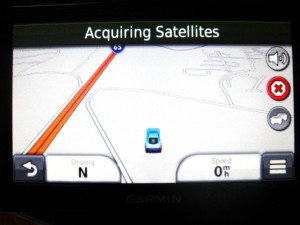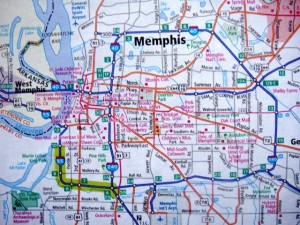When I first got a GPS unit, I was excited to have such a useful tool. A friend and I were travelling the back roads to Cross Creeks National Wildlife Refuge one day and I employed an Australian female to help us find our way there. We made it! After that, I used the GPS a lot while driving out of town or around my local area. One time I changed the settings from English to French just to hear someone instruct me to tourner à droite (turn right). I thought it gave me a bit of international flair while tooling around Nashville. Oddly, my husband didn’t like either the Australian or the French lady telling him where to turn.
I grew fond of my GPS. It was adept at finding restaurants, coffee shops, and motels in areas where I was not familiar. Once I found a butterfly egg on a cedar tree along a dusty road in the country. I wanted to return later to photograph the caterpillar after the egg hatched so I “marked” the spot with the GPS. When I returned a week or two later, I found the same tree with the caterpillar on it. Bravo!
GPS units are not infallible, however. Once I ventured to a city park with two nieces and a nephew in tow. The GPS lead us to a dead end street where we could easily see the park across a subdivision but there was no way to get there from where we sat. Seeking coffee on a trip, my husband and I were directed to a college campus student center. Several times, I have been sent in the wrong direction. Despite these flaws, when the old GPS wore out, I bought a new one.
Recently, however, I have begun to question my overuse of the GPS. Although it’s easy to follow the commands of a mechanical voice, my grown nephew said that he never uses a GPS because he fears he won’t know where he is going. He might be onto something. In an article titled “Is GPS All In Our Heads?” psychologist Julia Frankenstein writes:
Navigating, keeping track of one’s position and building up a mental map by experience is a very challenging process for our brains, involving memory (remembering landmarks, for instance) as well as complex cognitive processes (like calculating distances, rotating angles, approximating spatial relations). Stop doing these things, and it’ll be harder to pick them back up later. (New York Times, February 2, 2012).
Have I just exchanged one type of dependence, on my spouse, for another, on a GPS?
I am resolved to improving my skills at knowing where I am going. I think I’ll start with not saying that I am not good at directions. When I drive, I will practice mental mapping and try to eliminate distractions. I will use maps, note landmarks, and lay out a plan before getting in the car. I will not freak out if I get lost. Instead of listening to the Australian woman, the French lady, or the American husband telling me where to turn, I will choose my native language, the voice inside my head.
©Rita Venable 2013
Note: See the 7 worst driving distractions here: http://drivesteady.com/7-worst-distractions-while-driving. Note that one of them is a GPS unit.

